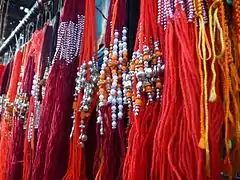Rakhri
Rakhri or Rakhrhee (Punjabi: ਰੱਖੜੀ) is the Punjabi word for Rakhi and a festival observed by Hindus and Sikhs.[2][3][4] In the Punjab region, the festival of Raksha Bandhan is celebrated as Rakhrhya (Punjabi: ਰੱਖੜੀਆ).[5] Rakhrhya is observed on the same day of the lunar month of Sawan. It, like Raksha Bandhan, celebrates the relationship between brothers and sisters. Rakhri means “to protect” whereby a brother promises to look out for his sister and in return, a sister prays for the well being of her brother. According to Fedorak (2006), the festival of Rakhri celebrates "the bonds between brothers and sisters".[6] Married women often travel back to their natal homes for the occasion. [7]
| Rakhrhya Punjabi: ਰੱਖੜੀਆ | |
|---|---|
 Examples of Rakihrhya | |
| Official name | Rakhrhya |
| Also called | Rakhar punya[1] |
| Observed by | Hindus & Sikhs |
| Date | Puniya (full moon) of Sawan ਸਾਵਨ ਪੁੰਨਿਆ |
| 2020 date | Monday, August 3 |
A Rakhri can also be tied on a cousin or an unrelated man. If a woman ties a Rakhri on the wrist of an unrelated man, their relationship is treated as any other brother and sister relationship would be. The festival is a siblings-day comparable to Mother's day/Father's day/Grandparents day etc.[8]
Celebration
A sister will tie the Rakhri on her brother's wrist and her brother will traditionally give his sister a gift in exchange. Another feature of the celebration is the consumption of sweets.[9] There is no special ceremony but a sister will sing folk songs[10] and say something along the lines of:
ਸੂਰਜ ਛੱਡੀਆਂ ਰਿਸ਼ਮਾਂ
ਮੂਲੀ ਛੱਡਿਆਂ ਬੀਅ
ਭੈਣ ਨੇ ਬੰਨੀ ਰੱਖੜੀ
ਜੁਗ ਜੁਗ ਵੀਰਾ ਜੀਅ
[11]
Transliteration:
Suraj chhadya rishma
mooli chhadya bi
bhain ne banni rahkhree
jug jug veera ji
See also
References
- Rana, Yudhvir (7 August 2014). "AAP to debut at Rakhar Punia fair". The Times of India. Retrieved 11 October 2020.
- Eleanor Nesbitt (2016) Sikhism: A Very Short Introduction. Oxford University Press
- Marian de Souza, Gloria Durka, Kathleen Engebretson, Robert Jackson, Andrew McGrad (2007) International Handbook of the Religious, Moral and Spiritual Dimensions in Education. Springer
- People of India: A - G., Volume 4 (1998) Oxford Univ. Press
- "Raksha bandhan is here!". The Hindu. 8 August 2014. ISSN 0971-751X. Retrieved 17 August 2016.
- Fedorak, Shirley (2006) Windows on the World: Case Studies in Anthropology. Nelson.
- Hess, Linda (2015) Bodies of Song: Kabir Oral Traditions and Performative Worlds in North India. Oxford University Press
- "Articles - Siblings Day Foundation". Retrieved 17 August 2016.
- Kristen Haar, Sewa Singh Kalsi (2009) Sikhism
- Pande, Alka (1999) Folk Music & Musical Instruments of Punjab: From Mustard Fields to Disco Lights, Volume 1
- Alop ho riha Punjabi virsa - bhag dooja by Harkesh Singh Kehal Unistar Book PVT Ltd ISBN 978-93-5017-532-3
